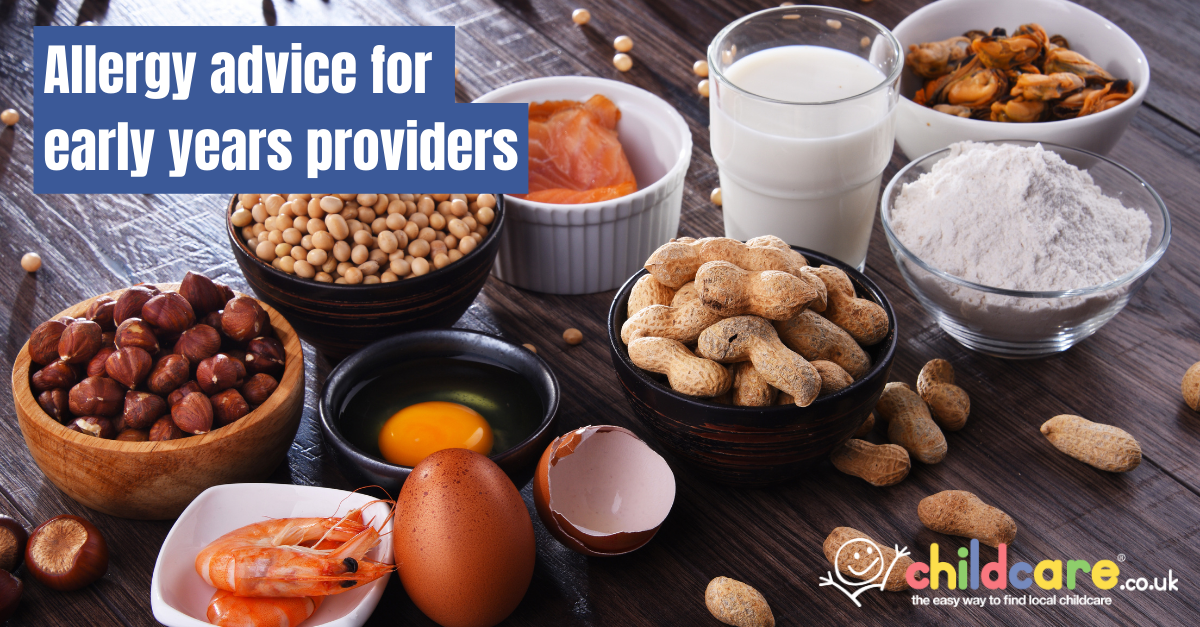Allergy Advice for Early Years Providers
Childminder Guides > Allergy Advice for Early Years Providers

Allergy Resources
Allergy Advice For Early Years Providers ![]()
Emergency Medication Administration Form ![]()
![]()
In the early years setting
Ensure you and staff in your setting are aware of:
• The 14 main food allergens - you might find it useful to read the allergy information from NHS and the allergy sheet from the Safer Food Better Business booklet.
• Common allergies - you will find useful guidance in factsheets from Allergy UK.
• How to treat allergies – all staff must have an up to date paediatric first aid qualification. Additionally, plan annual update training on how to use adrenaline auto injectors.
Parent partnerships
As a minimum, you must:
• Ask parents about their child’s allergies before they start in the setting and record the information.
• Learn more about the child’s symptoms and how to treat them.
• Work with parents and other agencies involved to keep up to date with changes to the child’s allergies.
• Ensure there is always a staff member with the child who has paediatric first aid training and knows the child and their allergies / medication needs inside the setting, on outings and at mealtimes.
Medication kit
As a minimum you must:
• Complete an Allergy Action Plan and Emergency Medication Administration Form with parents.
• Put together a labelled emergency medical kit for the child containing any required medication.
• Ensure the medication is out of sight and reach of children but immediately accessible to staff in an emergency (not in a locked cupboard).
• Set an alert to ask parents to renew medication before expiry dates.
• Update the Allergy Action Plan regularly.
In the setting and on outings
As a minimum, you must:
• Risk assess to provide a safer environment for the child.
• Risk assess outings to food establishments and on picnics / at play groups to ensure children are not in contact with potentially life-threatening allergens.
• Inform staff in the setting about the child’s allergies.
• Prepare handover information for any part-time / temporary staff who do not know the child which clearly states that the child has an allergy or anaphylaxis.
Reduce the risk of reactions
In case of food allergies
• Make changes to your menus to support the child – ask parents about appropriate substitutions.
• Read all food labels – be aware that ingredients change without warning.
• Keep a record of what the child has eaten to share with parents.
• Provide the child with, for example, a separate plate of food which has been prepared separately and cooked using individual utensils.
• At mealtimes, sit the child where they cannot take food from other children’s plates if the menu includes items which could cause the child to react.
• Speak to all parents about the risks of sending their child with food / allergens on them if a child is allergic. For example, a child who is allergic to peanut might react to a small amount of peanut on another child’s hands or face.
• Do not allow children to share food.
• Check ingredients used during sensory play if the child might react to resources.
• Follow allergy advice from Safer Food Better Business for childminders.
Note: If a child is weaning, they might react to any food. Food should be trialled at home first and settings must work with parents to reduce the risk of allergic reactions. There is a useful weaning pack to download on the Allergy UK website.
In case of environmental allergies
• Ask parents to give their child allergy medication at home before attending the setting if needed.
• Clean to reduce the allergen – for example, damp dust to remove dust in the atmosphere.
• Wash bedding and items the child uses with non-biological powder.
• Avoid playing outside if there is a high pollen count and the child reacts to grass, trees, plants etc.
On outings
• Take the child’s medication and paperwork on the outing.
• Ensure there is a staff member with an up to date paediatric first aid qualification.
• Risk assess the venue in advance – check for triggers which might harm the child.
General advice
• Be aware of the signs of an allergic reaction and ready to react quickly and calmly to support the child.
• Teach children how to wash hands thoroughly to avoid cross contamination.
• Encourage children to ask adults before, for example, touching food or taking part in activities when allergens might be present.
• Provide children with gloves during messy / sensory play.
• If the child has a latex allergy, check gloves, art equipment and balloons for latex content.
Don’t have an account? Register free today
Create a free account
Sign up in one minute, no payment details required.
Member benefits include:
- Add a free profile detailing your requirements or services
- Search by postcode for local members near you
- Read and reply to messages for free
- Optional paid services available
